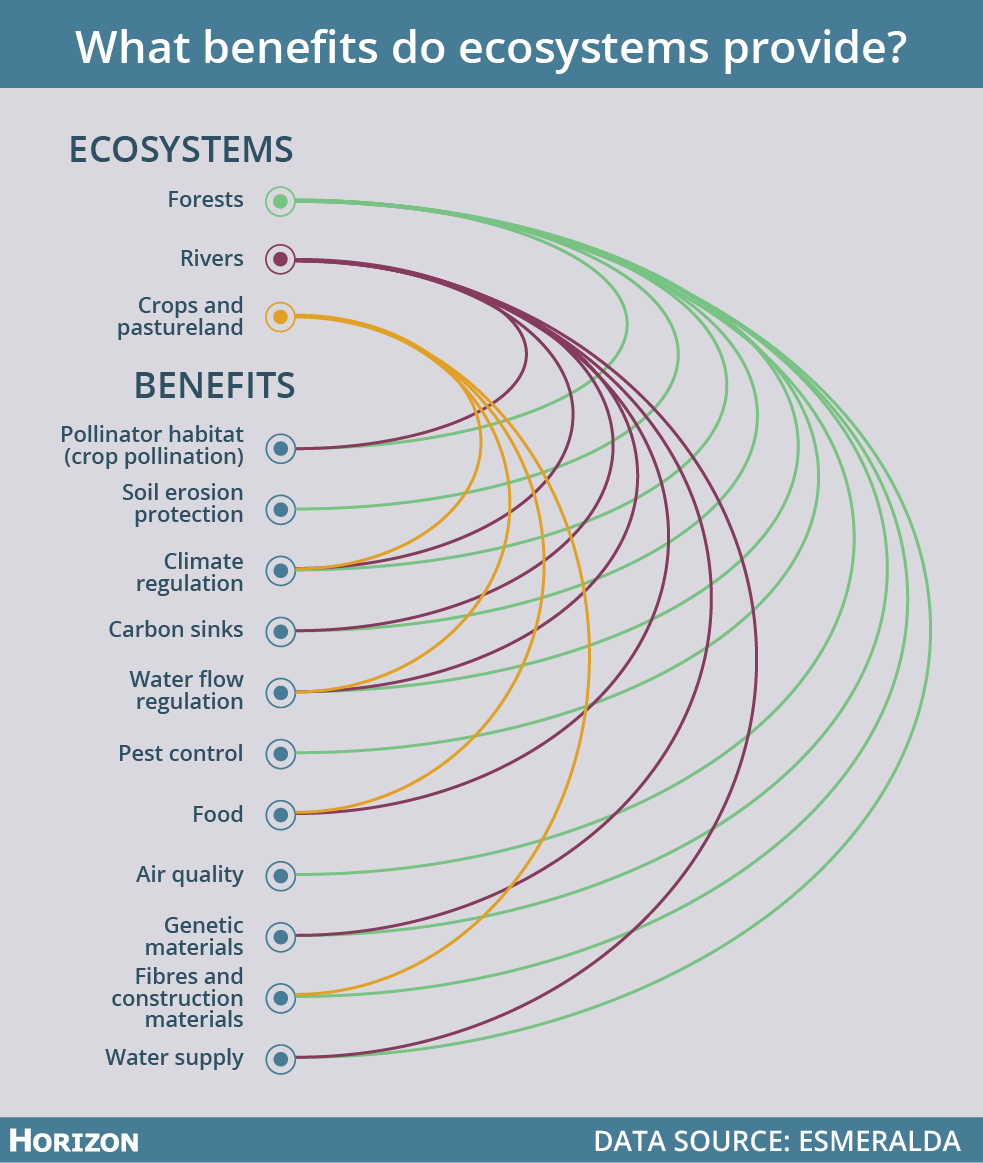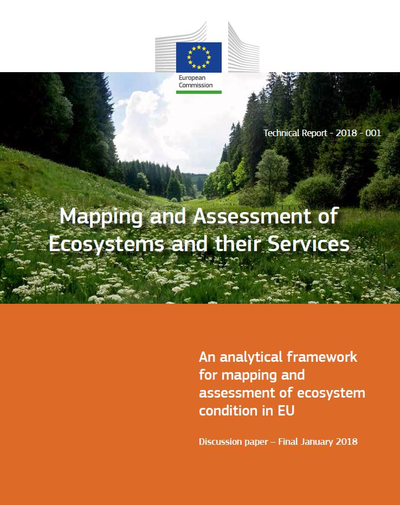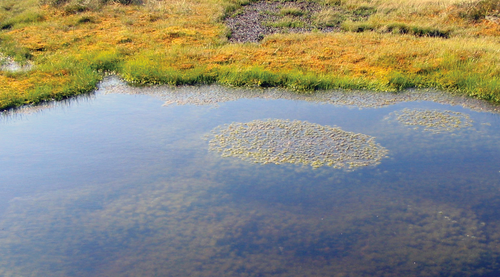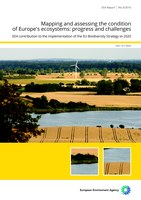News
The concept of quantifying these so-called ecosystem services, which has grown in recent years, has proved controversial for some environmentalists who oppose reducing nature to numbers. Others see it as a way to get businesses and policymakers to account for nature to make better decisions that preserve biodiversity.

First, though, working out what ecosystem services we have, and how much of them, requires mapping where they are. To aid this process, a project called ESMERALDA tested tools and methods to help decision-makers map and assess ecosystem services across Europe.
The end result is an open access online tool that provides full guidance for mapping and assessing ecosystem services.
‘The key message is to show the human dependence on functioning nature. Everything that we get and receive is related to ecosystems and their functions, and biodiversity,’ said Professor Benjamin Burkhard, a geographer at Leibniz University in Hannover, Germany, and project coordinator of ESMERALDA.
‘If we can really show how much a tree, for example, provides us with fresh air or how much carbon it’s sequestering, I think we will have more appreciation of nature’s contribution in society and decision-making,’ he said.
Land use
ESMERALDA’s approach takes into account three areas – biophysical, which refers to physical factors such as land use or volume of greenhouse gases – sociocultural and economic.
In its country case studies, ESMERALDA assessed different ways of valuing the three areas. For example, a study on Germany’s Bornhöved Lakes District combined biophysical data such as crop volumes and numbers of pollinators with sociocultural information including a survey of people on the aesthetic values of landscapes.
Prof. Burkhard says that a wide-ranging assessment is important to obtain a full picture. ‘It doesn’t help you to only have an economic value, but it also doesn’t help you to only have a social value. You need to have the whole set of biophysical, social and economic values for a perfect assessment,’ he said.

‘I’m an ecologist and would be happier if people were convinced just by having nice nature and lots of species – but this is not the way the world works at the moment, and usually the most convincing argument is money.’
Prof. Benjamin Burkhard, geographer, Leibniz University, Hannover, Germany

On the thorny issue of attaching economic values to nature, he says this approach can help raise awareness among policymakers and businesses.
‘I think it’s at least a good tool to convince many people,’ he said. ‘I’m an ecologist and would be happier if people were convinced just by having nice nature and lots of species – but this is not the way the world works at the moment and usually the most convincing argument is money.’
Prof. Burkhard says that awareness among EU decision makers about ecosystem services has grown over the course of the three-and-a-half-year project, which ended last July. The next stage for upcoming projects will be to start applying the ESMERALDA methodology in real-life situations, such as policymaking at a national level on issues such as agriculture, or local spatial planning.
For Guy Duke at the Institute of Chartered Accountants in England and Wales (ICAEW) valuing the world’s natural capital – its stock of natural assets – could help businesses make more environmentally sustainable decisions. However, he says that we are only at the ‘tip of the iceberg’ in terms of the number of companies that have started to understand and address this. ‘There’s a very long way to go,’ he said.
Duke leads the We Value Nature campaign which seeks to encourage businesses to embed the value of nature into their decision-making and apply the Natural Capital Protocol. This is a global set of standards that allows businesses to identify, measure and value what role natural capital plays in their business. The project is run by ICAEW, and other organisations that are part of the international collaboration, the Natural Capital Coalition.
Catalyst
‘We see our role very much as a catalyst of this idea,’ said Duke. ‘There has been a sea change in recent years, with the whole paradigm of natural capital finding its way into the policy space and business.’
Since launching last November, the project has started reviewing barriers and bottlenecks that impede businesses from investing in natural capital, with training to be later developed for companies.
Duke says one aim is to identify industry sectors in which action will bring the most benefit to nature, followed by specific businesses in those sectors and then individuals with the most influence on shaping decisions that affect natural capital and biodiversity.
Richard Spencer, head of sustainability at ICAEW, believes the approach is necessary. ‘To get business to grasp the quite perilous position we’re getting to, you’ve got to couch it in terms that people such as finance directors understand,’ he said. ‘If it’s economically invisible, people don’t make decisions about it.’
Spencer says some companies have recognised, for example, that restoring wetlands acts as an effective flood defence, thus saving money.
Nature
Spencer stresses that the project is not about attaching a single price that commoditises nature but about ascribing a value through a mix of descriptive information and numbers to build a complete story. ‘We never, ever put a price on nature,’ he said.
Natural capital is, however, far from an easy bedfellow of biodiversity and the term has provoked fierce debate among environmental activists such as the British campaigner George Monbiot who argue that the concept is not only wrong, but counterproductive.
Dr Berta Martín-López, a professor for sustainability science at the Leuphana University of Lüneburg, Germany, who worked on an earlier ecosystem services project called OpenNESS, warns future biodiversity programmes against putting too much stock in monetary value as a whole.
‘To me, the homogenisation of world views to only one simplistic view that fits with the mindset of monetary values and capitalism is the most dangerous pressure for biodiversity,’ she said.
‘By expressing values of nature only in monetary terms, we are not only overlooking the plural ways by which people give importance to nature, but also neglect multiple actors’ voices and their needs and interests.’
Dr Martín-López highlighted that nature goes far beyond just providing basic services – it also offers intangible, non-material benefits that cannot be valued in monetary terms.
‘The multiple ways by which people develop relationships with nature contribute to the construction of our cultural identity, sense of place and belonging,’ she said.
The approaches that will pave the way for the future, she says, are those that ‘foster a diversity of world views’.

The research in this article was funded by the EU. If you liked this article, please consider sharing it on social media.
This post The business of biodiversity: can we put a value on nature? was originally published on Horizon: the EU Research & Innovation magazine | European Commission.
The fifth MAES report presents indicators for mapping and assessment of ecosystem condition at European level. A set with specific indicators is available for assessment of ecosystem condition per ecosystem type. A core set with key indicators is available to support an integrated ecosystem assessment across ecosystem type.

Italian scientists have published an approach for mapping ecosystems at national scale. The publication is available here.
You can contact Giulia Capotorti for more information.
Two new positions open at the Helmholtz Centre for Environmental Research (UFZ) as a part of the large European-funded H2020 project ECOPOTENTIAL. The project is looking for one PhD student and one Postdoctoral researches to conduct ecosystem service research using earth observation data within the international project "ECOPOTENTIAL" with focus on habitats in European national parks.
ECOPOTENTIAL focuses its activities on a targeted set of internationally recognised Protected Areas, blending Earth Observations from remote sensing and field measurements, data analysis and modelling of current and future ecosystem conditions and services. ECOPOTENTIAL considers cross-scale geosphere-biosphere interactions at regional to continental scales, addressing long-term and large-scale environmental and ecological challenges.
For more information and to apply, see the job offers:
PhD: https://recruitingapp-5128.de.umantis.com/Vacancies/1056/Description/2?customer=5128
Postdoc: https://recruitingapp-5128.de.umantis.com/Vacancies/1085/Description/2?customer=5128
A new online course Ecosystem Services: a Method for Sustainable Development is now available immediately on the Coursera MOOC platform. Produced by the University of Geneva, the Geneva Water Hub, the Luc Hoffmann Institute and the Natural Capital Project, the course aims at anybody interested in mastering the strengths and weaknesses of the Ecosystem Services concept as a tool for promoting sustainable development.
Subjects covered will be both technical (methods for valuation, data acquisition, etc.) and socio-political (how to mainstream the process, criticism of the method, etc.). An introductory video (3min) gives a feel for the course content and philosophy.
Learners will hear from many of the field’s leading minds. The course is taught by three primary instructors and by 29 guest instructors and interviewees coming from many of the key institutions (the Natural Capital Project, WWF, IUCN, IPBES, TEEB, Luc Hoffmann Institute) and Universities. Learners can expect to hear multiple contrasting opinions. The full syllabus and list of instructors on the course page.
The course is offered "on-demand". In practice, class cohorts are formed on a regular basis and you can take as much time as necessary to complete the course (2-5 hours for 5 weeks is a rough estimate). The first cohort begins February 2nd 2017.
Access to all course materials is free. To obtain a certificate of completion costs 49 USD. Financial aid is available (see FAQs on bottom of the course page).
The Chair of Ecosystem Services at the International Institute Zittau / TU Dresden in Germany (Prof. Irene Ring) invites applications for two positions of a Research and Teaching Fellow / PhD Position on governance and valuation of ecosystem services, preferably related to the following topics:
1) Ecosystem services in economic accounting
2) Ecosystem services in intergovernmental fiscal relations
These posts entail 50% of the fulltime weekly hours, offering a contract of 3 years.
Requirements: Very good or good university degree (Masters or equivalent), preferably in economics, agricultural, forestry or environmental sciences with a focus in ecological economics or environmental economics; familiarity with the ecosystem services concept. A background in the following areas is of advantage: environmental valuation and environmental-economic accounting (topic 1); public finance, economic analysis of environmental policy instruments and ecological fiscal transfers (topic 2); quantitative and qualitative methods in economics / social sciences (both topics). Very good English and German language and communication skills are also required. The posts also involve teaching in English language in the newly introduced MSc Programmes of "Ecosystem Services" and "Biodiversity and Collection Management".
Closing date: January 9, 2017.
For further details on the job description and requirements: in English Deutscher Ausschreibungstext
The international scientific conference "Mapping and assessment of ecosystem services - science in action" aims to bring together researchers from different countries to discuss the scientific aspects of mapping and assessment of ecosystems and their services. It will be focused on the methods for mapping of ecosystem services, the challenges and problems of their implementation in the national assessments related to MAES. The program includes plenary sessions with keynotes and workshops on the main conference topics:
- Mapping of ecosystems
- Assessment of ecosystem’s condition
- Mapping and assessment of ecosystem services
-
Biophysical perspectives
-
Socio-cultural perspectives
Mapping of ecosystems
The assessment of ecosystems and their services needs spatially explicit data representing the landscape heterogeneity of different areas. This topic aims to address the ecosystem typologies used at European and national scales, the variety of spatial datasets and methods used for delineation of ecosystems and correspondence between the approaches applied in different countries.
Assessment of ecosystem’s condition
The assessment of ecosystem’s condition requires information about drivers (land use, mmanagement), pressure (land-take, pollution, climate change) and their impact on the structure and function of the ecosystems. The main objective of this topic is to discuss about appropriate indicators for ecosystem condition, quantification of these indicators and spatial representation of the indicators data.
Mapping and assessment of ecosystem services – biophysical perspective
Ecosystem services need to be mapped in their integrity based on the capacity to ecosystems to provide multiple services. Biophysical methods for mapping ecosystem services are used to quantify ecosystems’ capacity to deliver ecosystem services and the amount of this capacity to ensure human benefits. In this topic, the objective is to discuss the variety of methods for quantification of indicator for ecosystem services, the challenges and problems in their spatial representation as well as their application in national assessments.
Mapping and assessment of ecosystem services – socio-cultural perspective
Socio-cultural methods are related to analyzes of human preference, uncover of individual and collective values and perceptions towards ecosystem services in non monetary units. This topic addresses the problems and challenges in the application of socio-cultural methods for mapping and assessment purposes and their potential to derive indicators for ecosystem services supply, flow and demand.
More information is availabe on the official conference website.
The General Assembly 2017 of the European Geosciences Union (EGU) is held at the Austria Center Vienna (ACV) in Vienna, Austria, from 23–28 April 2017. The assembly is open to the scientists of all nations. Find out more on the event's website: http://egu2017.eu/home.html
A special session at the event will look at threats and potentialities of urban and peri-urban ecosystems.
SSS9.4/HS11.54/NH1.20
|
|
Convener: Carla Ferreira Co-Conveners: Zahra Kalantari , Rory Walsh , Paulo Pereira , Artemi Cerdà |
Urban and peri-urban areas roost most of the world population. The high human pressure is amplifying the impacts of the natural hazards in these areas, including human lives and ecosystems sustainability. Urbanization changes the water cycle due soil imperviousness, and normally, increase the runoff and flood hazards. These events have to be managed and mitigated due to the destruction caused and due to problems related to water demand and pollution. Other important problem in urban areas is the increase of land degradation as a consequence of activities that constitute a threat to soil (e.g. construction works, residues deposition). Land degradation do not affect only the sustainability of the ecosystems but also the production capacity of the soil.
This session aims to give an overview of the problems within urban and peri-urban areas, namely related with soil, water, vegetation and hazards, and to discuss the current and future management issues to the challenge of global changes. Contributions regarding to sustainable ways to improve water, nutrients and energy cycles within these areas and how to use the ecosystem services to mitigate impacts of future extreme events and hazards are also welcome.
The Belgian community of practice on Ecosystem Services announces third edition of the BEES Market. This year’s host is the Natural Capital Platform of the Faculty of Bioscience Engineering at Ghent University and the market will take place on Tuesday 13th of December 2016 at Congrescentrum ‘Het Pand’ in Ghent.
The BEES Xmas market brings together people from academia, public administration and civil society, from Belgium and abroad, with one common interest: ecosystem services. The BEES market is the perfect spot to exchange ideas, learn from other experiences and discover how ecosystem services are transformed into real products or daily life applications.
The concept? A cozy afternoon in a friendly Xmas market-like atmosphere: the perfect event to wrap up 2016 in a useful and fun way! Exibitors can choose to have a stand, give a training session or just to enjoy the market.
Register here before 20th of November.

The Swedish Species Information Centre is a national center for species and habitats. The cetre contributes to a sustainable management of the natural resources by collecting, analyzing and making data available, and by describing andpresenting facts about biodiversity. The organization interacts nationally and internationally, with focus on the benefit for conservation. Now the Swedish Species Information Centre recruits two people who will model and simulate the distribution and (meta)population dynamics of species.
Postdoc 1: Modelling and projecting forest ecosystem service
Postdoc 2: Modelling for population viability analyses in forest
Deadline: October 17, 2016.
As part of the new 6th Global Environment Outlook (GEO-6) UNEP has just released a separate Assessment for the pan-European region. The report provides an overview on the current state, trends and an outlook for the environment, and also highlights environmental factors that contribute to human health and well-being at the regional level.
The assessment for the pan-European region clearly indicates that biodiversity loss and ecosystem degradation is continuing in the region. Ongoing biodiversity decline and loss is particularly high in Eastern and Western Europe. Some positive developments and individual success stories offer lessons worth learning, for example developments of protected area networks such as Natura 2000 and the pan-European Emerald Network. However, an important challenge that needs urgent attention is improving availability and open access to comprehensive and integrated biodiversity data to support assessments and analysis, as well as planning and implementation of conservation efforts.
The full report can be found here: http://bit.ly/21q2ghL
UNEP press release: http://bit.ly/24A7sQN
A new Special Issue (edited by Benjamin Burkhard, Stefan Hotes and Hubert Wiggering) of the online and fully open-access journal LAND deals with questions of ecosystem services delivery in managed and human-modified systems. Existing agricultural systems in different socio-ecological settings are analysed based on system-oriented modeling and simulation, experimental work, observations, interviews with experts, stakeholders and farmers, and analyses of agriculture and land use systems.
Based on that, concepts for improved agricultural systems that aim to integrate the supply of/demand for multiple agro(eco)system services so as to maintain long-term ecosystem functioning are elaborated.
All articles can be accessed from the journal website.

Following the 8th ESP Conference last year in Stellenbosch, the new ESP-associated journal One Ecosystem is now ready to welcome your contributions to its first Special Issue "Ecosystem services – methods, data and applications". One Ecosystem is an innovative Open Access scholarly journal that welcomes, in addition to conventional research papers, contributions documenting the entire research cycle, including data, models, methods, workflows, results, software, perspectives and policy recommendations. Contributions from all ESP 8 sessions and ESP Working Groups are welcome!

Scope of the Special Issue
With this Special Issue (and the new Journal) the main intention is to really make a difference, by promoting and supporting methods and data sharing, ideas exchange and dissemination of relevant applications in the sphere of ecosystem services. For this reason, the focus of this Special Issue is kept broad, welcoming all contributions related to ecosystem service research methods, data and their applications in science, policy making, society and practice. Please contact one of the Special Issue editors in case you are unsecure whether your specific topic is fitting.
Timeline
Call for papers: March 2016
Indication of interest (authors): April 11, 2016 (but also later indications may be considered)
Submission of papers: any time, but preferably before June 1, 2016
Publication individual papers: when ready
Collection for Special Issue: September 2016
Download the official Call for Papers here.
Twi PhD positions for ecosystem services in coastal regions have been opened at Kiel University. Click on the links below to download the official offers and learn how to apply.
Project BACOSA II:
1 position for Ecological Assessment
1 position for Economic Assesment.
Application deadline: March 31, 2016.
The University of Southampton is seeking to appoint two Research Fellows to work with Dr Felix Eigenbrod on his European Research Council Starting Grant, "Scaling Rules for Ecosystem Service Mapping (SCALEFORES)" in the School of Geography and the Environment. Qualified applicants are encouraged to apply for both positions.
Position 1: Applied Biogeography. Apply at: https://jobs.soton.ac.uk/Vacan
Position 2: Spatial Modelling. Apply at:https://jobs.soton.ac.uk/Vacan
The deadline for application for both positions is 1 April 2016.
Biodiversity decline is a fact, but how can society be convinced of the benefits of biodiversity for human well being and of the necessity of further protective action? The FP7 funded EU project Biodiversity and Ecosystem Services: Arguments for our Future Environment (BESAFE) addressed this challenge to produce guidance that can help improve the way we use arguments for conservation and convincingly demonstrate the value of biodiversity to decision-makers.

Credit: Rob Bugter
Two key outputs of the project are the final brochure "How to Argue for Biodiversity Conservation More Effectively: Recommendations from the BESAFE project", including key conclusions from project publications and case studies, and an interactive online tool, which can lead stakeholders to the relevant information in a few mouse clicks.
Key recommendations of BESAFE featured in these resources are:
- The success of a more integrated approach depends on stakeholder engagement. A top-down policy framework that sets goals for the protection of particular sites and species is important, but it is not enough to prevent biodiversity loss. - -- An integrated approach, seeking to 'mainstream' biodiversity concerns across all policy sectors (e.g. agriculture, forestry, water, energy, transport and urban planning) is needed.
- Promote bottom-up initiatives at the local level. All stakeholders need to be actively involved in the decision-making process, which should facilitate building trust and working towards generally agreed and accepted solutions.
- Tailor arguments to the audience. Arguments need to be framed to fit the values and goals of the audience, embracing the plurality of values attached to nature, and using appropriate language. For example, over-emphasising economic arguments could alienate people who are motivated mainly by ethical and moral concerns.
- Use positive arguments. Positive framing of arguments to emphasise benefits is often more powerful than negative framing that focuses on threats and losses. The concept of ecosystem services is useful for emphasising positive benefits, provided that it is properly explained to stakeholders.
- Use a wider range of arguments. Arguments based on the economic value of nature for humans dominate European and national policy-making, and are often seen as central to gaining high-level policy-maker support, but our results show that many decision-makers and other stakeholders also use and respond positively to ethical and moral arguments.
"We aimed to provide the essence of 4 years worth of research in an easy to read and reuse form, to maximise the potential of using the right arguments for conservation at the right time in order to successfully demonstrate the value of biodiversity to decision-makers," comments Rob Bugter, co-ordinator of the BESAFE project.
Try out the resources below:
Bugter R., Smith A.C. and the BESAFE consortium. 2015. How to argue for biodiversity conservation more effectively. Recommendations from the BESAFE project. Pensoft Publishers, Sofia, 26 pp. Available at: http://www.
BESAFE web tool available at: http://tool.
 We depend on healthy and resilient ecosystems to continue to deliver services, such as food, water, clean air and stable climate, which are essential for our well-being. A new EEA report provides an overview about the current condition of ecosystems in Europe and the human pressures they are exposed to.
We depend on healthy and resilient ecosystems to continue to deliver services, such as food, water, clean air and stable climate, which are essential for our well-being. A new EEA report provides an overview about the current condition of ecosystems in Europe and the human pressures they are exposed to.
An ecosystem map for Europe reveals that many ecosystems are highly concentrated in a small number of countries, which could increase their vulnerability to environmental change, and a substantial proportion of the most vulnerable ecosystems are not protected within Natura 2000 sites, Marine Protected Areas or equivalent zones.
Download the report on the EEA dedicated page.
Go ahead and test an advanced beta version of MapNat, the ecosystem service (ES) mapping smartphone App.
 MapNat lets you map the ecosystem services you are actually using in the very moment of mapping. So the mapping perspective is that of ES use or ES ‘flow’. It is designed as a citizen science tool, to be used to get to know more about how people appreciate and use different ES. Just map which ES you are using. On the map display you can also assess which ES have been used by others, what they commented and how often they use/enjoy the ES they mapped or how severe they judge the disservices they encountered.
MapNat lets you map the ecosystem services you are actually using in the very moment of mapping. So the mapping perspective is that of ES use or ES ‘flow’. It is designed as a citizen science tool, to be used to get to know more about how people appreciate and use different ES. Just map which ES you are using. On the map display you can also assess which ES have been used by others, what they commented and how often they use/enjoy the ES they mapped or how severe they judge the disservices they encountered.
Any technical and thematic comments are welcome. For questions, comments please contact: joerg.priess(at)ufz.de .
Download the App for Android devices here.
Download the instructions (Pdf) here.
Focused on the fields of ecology and sustainability, One Ecosystem is an innovative open access scholarly journal that goes beyond the conventional research article publication. Launched in January 2016, the new journal is now open for submissions ranging across the entire research cycle, including data, models, methods, workflows, results, software, perspectives and policy recommendations.
Ecosystem services, Ecology and Sustainability are research areas that address highly relevant scientific and societal topics. One Ecosystem aims to respond to the newest developments in scholarly publishing, adapting them for and applying them to these fields.
The journal offers a wide set of article templates, including domain-specific ones, such as Ecosystem services mapping, Ecological models or Environmental monitoring, allowing scientists to publish and get credit for their work at any stage of the research cycle. Through the technologically advanced ARPHA publishing platform and innovative publishing model, all data that underpin a given study will be made free to everyone and integrated into relevant and domain-specific global data repositories.
"We need better incentives for scientists who want to share their data. One Ecosystem provides such incentives by linking peer review to open data" adds Joachim Maes, European Commission - Joint Research Centre.
"We believe that open access to all the relevant products of the scientific cycle is key to both scientific advancement, and innovation in the real world. With One Ecosystem we aim at fostering open exchange of information to address sustainability challenges." - Deputy Editor-in-Chief Dr. Davide Geneletti, University of Trento.
Open access to content and data is quickly becoming the prevailing model in academic publishing and research funding schemes. By making research outputs public, the new journal opens up new mechanisms for integration of information, collaboration, appraisal, and dissemination. Committed to openness and innovation, One Ecosystem offers a novel community-based peer-review introduced for the first time in these academic disciplines. The journal gives authors and reviewers the opportunity to opt for an entirely open review process.
Making use of the unique ARPHA Writing Tool, One Ecosystem does not only enable authors to prepare their manuscripts directly within the system, but also allows to submit pre-submission reviews from the very start. These reviews or supporting statements from experts in the subject will facilitate the manuscript evaluation and speed up the publishing process.
"With One Ecosystem we want to accelerate scientific progress in the frontier research fields of ecology and sustainability. We are convinced that this new format of writing, reviewing and open access publishing of scientific findings is the future", explains the Editor-in Chief of One Ecosystem - Dr. Benjamin Burkhard, University of Kiel.

The Institute of Environmental Planning at Leibniz Universität Hanover, contingent upon approval from the funding institution, invites applications for four PhD positions in Landscape Planning and GIS, Landscape Ecology, Social Sciences, and Economics.
The positions are part-time (50%) and limited to up to five years. Successful applicants will contribute to the research group PlanSmart, exploring innovative approaches to planning and implementing nature-based solutions for resilient development of metropolitan regions. PlanSmart focusses on water-borne challenges, cooperates with the Leibniz Centre for Agricultural Landscape Research and is funded through the program for Social-Ecological Research by the
Federal Ministry of Education and Research.
The following positions are available:
- PhD position in Landscape Ecology or Landscape Planning: Modelling ecological potentials, risks, and effectiveness of nature-based solutions
- PhD position in Social Sciences: Assessing social conditions and effects of nature-based solutions
- PhD position in Economics: Modelling economic risks, impacts and benefit-cost-ratios of nature-based solutions
- PhD position in Landscape Planning and GIS: Developing a GeoDesign tool for the participatory planning of nature-based solutions
See the official job announcements here: http://www.umwelt.uni-hannover.de/vacancies0.html
For more information and inquiries concerning PlanSmart and the positions, please contact Dr. C. Albert, email: albert@umwelt.uni-hannover.de
